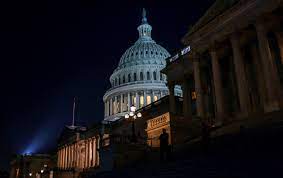The United States Senate enacted bipartisan legislation backed by President Joe Biden on Thursday that raises the government’s $31.4 trillion debt ceiling, preventing a first-ever default.
The Senate voted 63-36 to adopt the package passed by the House of Representatives on Wednesday, as lawmakers raced against the clock after months of bitter wrangling between Democrats and Republicans.
The Treasury Department had warned that if Congress did not act by June 5, it would be unable to pay all of its payments.
“We are avoiding default tonight,” Senate Majority Leader Chuck Schumer said as he guided the bill through his 100-member body on Thursday.
Biden praised Congress for acting quickly. “This bipartisan agreement is a big win for our economy and the American people,” Democratic President Barack Obama said in a statement, adding that he will sign it as soon as possible. He stated that he would make another remark on Friday at 7 p.m. EDT (2300 GMT).
Biden was personally involved in the bill’s negotiations with House Speaker Kevin McCarthy.
While this contentious debate has over, Senate Republican Leader Mitch McConnell has already signaled the next budget conflict.
“In the coming months, Senate Republicans will continue working to provide for the common defense and control Washington Democrats’ reckless spending,” he added in a statement.

McConnell was referring to the 12 bills that Congress will work on this summer to fund federal programs in the fiscal year that begins Oct. 1, as well as carry out the broad instructions of the debt limit bill.
Meanwhile, Treasury Secretary Janet Yellen delivered a sharp warning, stating, “I continue to strongly believe that the full faith and credit of the United States must never be used as a bargaining chip,” as Republicans have done in recent months.
Senators ripped through over a dozen amendments before the final vote, rejecting all of them during a late-night session in preparation of Monday’s deadline.
The statutory limit on government borrowing will be suspended by this act until January 1, 2025. Unlike most other affluent countries, the United States limits the amount of debt the government can incur, regardless of legislative spending.
“America can breathe a sigh of relief,” Schumer said in Senate remarks.
‘TIME IS A LUXURY’
Republicans had resisted any debt limit hike until they agreed to some broad-based expenditure cutbacks, which they claimed would start tackling the nation’s rapidly rising debt.
Instead, Biden advocated for higher taxes on the affluent and companies to help solve the nation’s mounting debt. Republicans refused to contemplate any tax increases.
Both parties refused to contemplate cutting the huge Social Security and Medicare retirement and healthcare programs, and McCarthy refused to consider cutting military or veteran expenditures.
This left a relatively small group of domestic “discretionary” programs to bear the brunt of spending reduction. Republicans ultimately got $1.5 trillion in cuts over ten years, which may or may not be completely implemented. Their initial proposal was for $4.8 trillion in savings over a decade.
Treasury technically reached its borrowing limit in January. Since then, it has used “extraordinary measures” to raise the funds needed to pay the government’s bills.
Biden, Yellen, and legislative leaders all admitted that a default due to a shortage of funding would have catastrophic consequences. These included sending shockwaves across global financial markets, perhaps causing job losses and a recession in the United States, and hiking interest rates on everything from home mortgages to credit card debt for families.
The bill was passed by the Republican-controlled House on Wednesday evening, 314-117. The majority of those voting against the bill were Republicans.
“Time is a luxury that the Senate does not have,” said Schumer on Thursday. “Any needless delay or last-minute holdups would be an unnecessary and even dangerous risk.”
Among the amendments addressed were proposals to impose steeper expenditure cuts than those included in the House-passed package and to halt the expedited final approval of a West Virginia energy pipeline.

COBBLED OVER WEEKS
As large numbers of immigrants arrive at the US-Mexico border, Republican Senator Roger Marshall proposed tougher border regulations. He said that his proposal would “put an end to the culture of lawlessness at our southern border.”
However, the amendment was defeated in the Senate. Democrats claimed it would endanger kid migrants and deprive American farmers of essential labor.
Some Republicans also wanted to increase defense spending above the amounts included in the House-passed plan.
In response, Schumer stated that the spending restrictions in this measure would not prevent Congress from approving additional funds for emergencies, such as assisting Ukraine in its fight against Russia.
“This debt ceiling deal does nothing to limit the Senate’s ability to appropriate emergency supplemental funds to ensure our military capabilities are sufficient to deter China, Russia, and our other adversaries, as well as respond to ongoing and growing national security threats, including Russia’s evil ongoing war of aggression against Ukraine,” Schumer said.
The plan was pieced together during weeks of intense talks between senior Biden and McCarthy aides.
The main point of contention was Republicans’ desire to drastically reduce expenditure on discretionary programs such as housing, environmental protection, education, and medical research over the next few years.
According to the impartial Congressional Budget Office, the plan would save $1.5 trillion over ten years. This is less than the $3 trillion in deficit reduction recommended by Biden, primarily through additional taxes.
The last time the US came close to defaulting was in 2011. This impasse shook financial markets, resulted in the government’s credit rating being downgraded for the first time, and increased the country’s borrowing costs.
There was less drama this time since it was evident last week that Biden and McCarthy would reach an agreement with enough bipartisan backing to pass through Congress.


